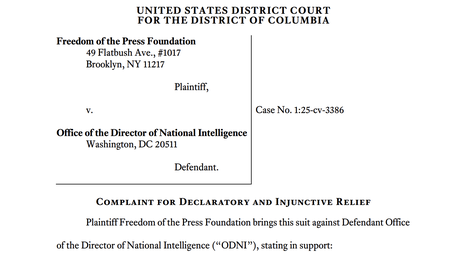Three new FPF FOIA suits target threats to transparency, press freedom


AP Illustration
The Freedom of Information Act gives the public a right to access government records.
The Freedom of Information Act is supposed to shed light on government activity by giving journalists and the public access to government records. But the law is in shambles. From endless delays in response time and unjustified refusals to ridiculously overbroad redactions, FOIA is plagued with problems.
We must fight back against the government’s refusal to comply with FOIA and urge Congress to reform the law and end backlogs of requests, reduce the number of exemptions, and overturn damaging court decisions.

U.S. Press Freedom Tracker highlights costs of government secrecy to taxpayers

Legal brief challenges secrecy around injuries and deaths in San Diego County jails

Funding local news may be the best response if officials continue to yank contracts in response to critical news coverage

New Jersey lawmakers shouldn’t use a lame-duck session to gut the state’s public records law

Journalists and the public need to know officers’ identities to hold them accountable for their official actions

The Community News and Small Business Support Act would use tax credits to improve local news’s financial outlook

Jack Dorsey’s #startsmall backs efforts to reform the government secrecy system, while honoring the late Daniel Ellsberg

Denying the press and public access to records isn’t the right way to protect academic freedom

A new decision from Pennsylvania unnecessarily complicates the public’s right to know about government business conducted on social media

We will honor our friend by fighting for what he fought for his entire life: an end to excessive government secrecy.
Something went wrong and your email updates subscription could not be processed. Please visit our signup page and try again.
Thanks for helping us protect FOIA and the right of the press and public to know what the government is up to.
Share this message on social media: